AI B2B Marketing for Your Go-To-Market Evolution
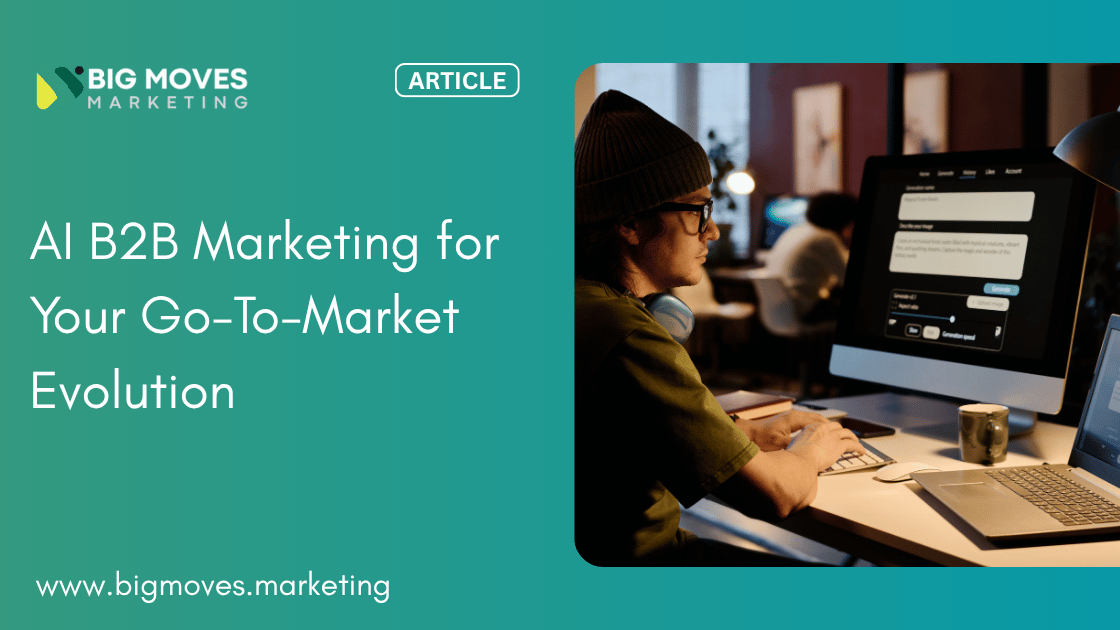
Let’s be honest, AI in B2B marketing isn’t about some futuristic, sentient machine taking over your job. It’s about giving you a partner—a strategist—that can sift through mountains of data to find the golden nuggets that your human intuition can then act on. It’s the difference between guessing what your next best customer wants and knowing, all before they even start their search.
This is what AI B2B marketing really is: using smart technology to sharpen your marketing efforts, connect with buyers on a deeper level, and do it all at a scale that was impossible just a few years ago.
The New B2B Marketing Playbook
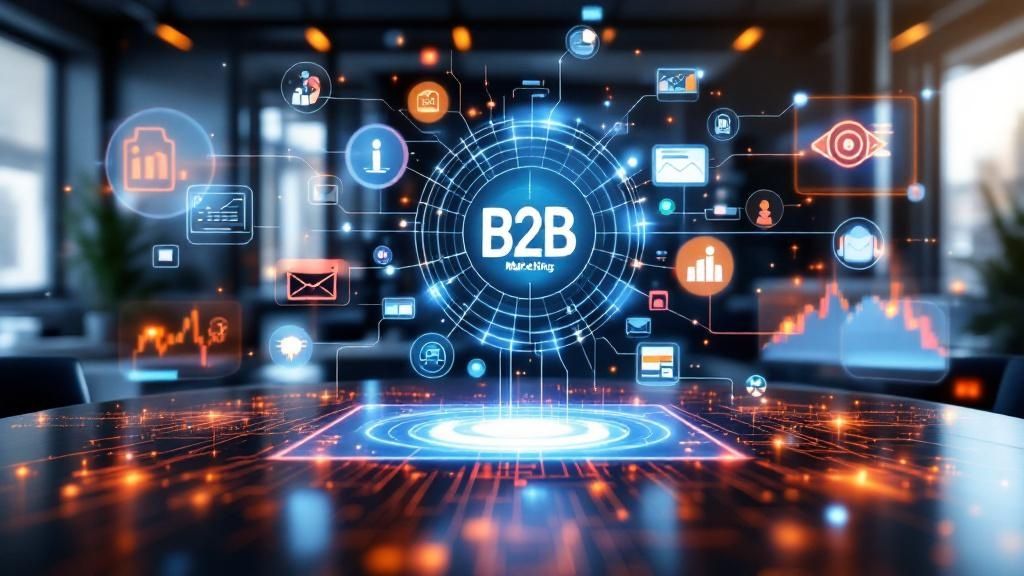
Picture a colleague who never gets tired. This partner analyzes billions of market signals in real-time, pinpoints your next best account before they even realize they have a need, and helps you craft the exact message that will resonate with them. That’s not science fiction anymore; it’s the new reality of AI B2B marketing.
For too long, the term "AI" has been bogged down by hype and overly technical explanations. Let's cut through that. In a B2B setting, AI is simply about backing up your team's expertise with undeniable, data-driven precision. It's not a tool to replace marketers; it’s a tool that makes them smarter and faster.
By taking over the repetitive, data-heavy lifting, AI frees you and your team to focus on what people do best: thinking about the big picture, solving complex problems creatively, and forging genuine relationships. This is the core shift—we're moving away from launching disconnected campaigns and toward orchestrating an intelligent, self-improving marketing ecosystem.
Beyond Automation to Augmentation
Think of your classic marketing automation platform as a very capable assistant who diligently follows a predefined checklist. It sends the emails you schedule, posts the content you create, and tracks the basic actions you tell it to. It's efficient, for sure, but it’s also rigid.
AI, on the other hand, is like promoting that assistant to a strategic advisor.
This advisor doesn't just follow the rules you set; it learns, adapts, and starts making its own informed recommendations. It can tell you which accounts you should prioritize this quarter, what kind of content will actually get their attention, and when the best time to reach out is for the biggest impact. It turns marketing from a reactive, box-ticking function into a proactive engine for growth.
The goal of AI in B2B marketing isn't to remove the human element, but to amplify it. It gives marketers the insights and the breathing room to be more strategic, more creative, and ultimately, far more effective.
An Organic Marketing Ecosystem
This new playbook doesn't see your marketing activities as isolated tactics. Instead, it views them as a single, interconnected system that’s constantly learning and getting better on its own. Every email opened, every link clicked, and every piece of content consumed feeds back into the system, making it smarter and more finely tuned to what your buyers actually need.
This creates an incredibly powerful feedback loop where your marketing naturally becomes more relevant and effective over time. Here’s what that looks like in the real world:
- Anticipating Needs: AI can analyze behavior patterns to predict what a buyer will be looking for next, letting you serve up the perfect solution before they even type a query into Google.
- Adapting in Real-Time: Your website, your ads, and even your email outreach can dynamically change based on who is looking at them—their industry, their job title, or how they've interacted with you in the past.
- Deepening Relationships: When you understand a customer's intent on a much deeper level, you can build trust and loyalty by consistently providing relevant, valuable information.
At the end of the day, embracing AI B2B marketing is about building an operation that’s not just more efficient, but also more empathetic and aligned with how modern buyers actually make decisions. It's about creating marketing that feels less like a sales pitch and more like a genuinely helpful guide on their journey.
How AI Is Redefining B2B Success

This isn’t just a new chapter in the marketing playbook; it’s a completely different book. The way businesses build real, valuable connections is being fundamentally reinvented, and AI B2B marketing is the driving force. It's creating a clear divide between companies that are keeping up and those getting left behind.
We’re not talking about minor efficiency tweaks. This is about adding a layer of intelligence to your core marketing functions that gives you something close to strategic foresight. The whole thing really boils down to three game-changing capabilities: predictive accuracy, dynamic personalization, and intelligent automation.
The money tells the story. The global AI in marketing sector is expected to hit a staggering $47.32 billion in 2025, a huge leap from $12.05 billion back in 2020. With projections soaring past $107.5 billion by 2028, it’s obvious this isn't just a trend—it's a fundamental business shift.
Uncovering Future Customers With Predictive Lead Scoring
Traditional lead scoring is a bit like driving while looking only in the rearview mirror. It ranks leads based on what they’ve already done—filled out a form, watched a webinar, opened an email. It’s helpful, sure, but it's reactive. It often completely misses the subtle cues of a buyer who’s about to make a decision.
Predictive lead scoring, on the other hand, is like having a crystal ball. It sifts through thousands of data points—behavioral signals, firmographics, historical conversion data—to forecast which accounts are actually on the verge of buying. It doesn't just see what a lead has done; it predicts what they will do.
AI can spot "in-market" buyers weeks or even months before they ever visit your website. This lets your sales team connect with high-value accounts at the perfect moment—not just when a lead finally decides to raise their hand.
For instance, an AI model might pick up on a pattern: employees at a target company are suddenly researching your competitors, their finance team is visiting third-party review sites, and they just posted a job for a role that uses your type of solution. A human team could never connect those dots in real-time. By flagging this account, AI gives your sales reps a massive head start.
Crafting One-to-One Experiences at Scale
Personalization has always been the holy grail in B2B, but it's been incredibly hard to achieve. Unlike B2C, where a purchase might be an impulse, B2B buying journeys are long, complex, and involve a whole committee of stakeholders. A generic, one-size-fits-all message just falls flat.
This is where AI-driven dynamic content really shines. Instead of creating a few static website versions for broad audience segments, AI can tailor your website, ads, and emails for every single visitor, instantly.
Think about it like this:
- Website Personalization: A prospect from the financial services industry lands on your homepage. AI immediately swaps out the generic hero image and case studies with content specifically for banking, showing them exactly how you solve their industry's unique problems.
- Ad Retargeting: An account spent time looking at a specific feature on your site. Now, they see hyper-relevant ads across the web that speak directly to that feature’s benefits, reinforcing your value where it matters most to them.
- Email Nurturing: An AI-powered system adjusts the content in your nurture sequence based on how a prospect engages. If they click a link about a certain use case, the next email automatically pivots to provide more information on that topic.
This kind of deep personalization builds trust and shows you truly understand the buyer's world, which can dramatically shorten the sales cycle. Of course, this technology delivers the biggest wins when your core https://bigmoves.marketing/blog/ai-creates-massive-impact-when-your-b2b-saas-strategy-is-on-point—AI is at its best when it has a clear target to aim for.
Automating More Than Just Tasks
Finally, let's talk about intelligent automation. This goes way beyond just scheduling social media posts or setting up a simple email drip. AI-powered automation can manage complex, multi-step workflows that require judgment and adaptation.
It can orchestrate entire marketing campaigns, trigger sales alerts based on subtle buying signals, and even draft personalized outreach emails for reps to review and send.
By offloading these sophisticated but repeatable processes to AI, your team is freed up to focus on the high-value work that truly moves the needle—building relationships, talking to customers, and exploring new strategic opportunities. This is how AI B2B marketing ultimately redefines success: by creating a smarter, more predictive, and deeply personal engine for growth.
Strategic AI Applications for B2B Growth
Alright, let's move past the buzzwords and get down to what actually works. The real magic of AI in B2B marketing isn't about some mythical "easy button." It's about strategically applying smart technology to specific, high-leverage points in your growth engine.
When you do it right, these applications work together to give you a serious leg up on the competition. From sniffing out untapped content opportunities to making sure your sales team only talks to red-hot accounts, AI provides the firepower to elevate your entire marketing game.
Let's look at the playbooks that winning B2B teams are running right now.
This is a great snapshot of how B2B marketers are actually using these tools.
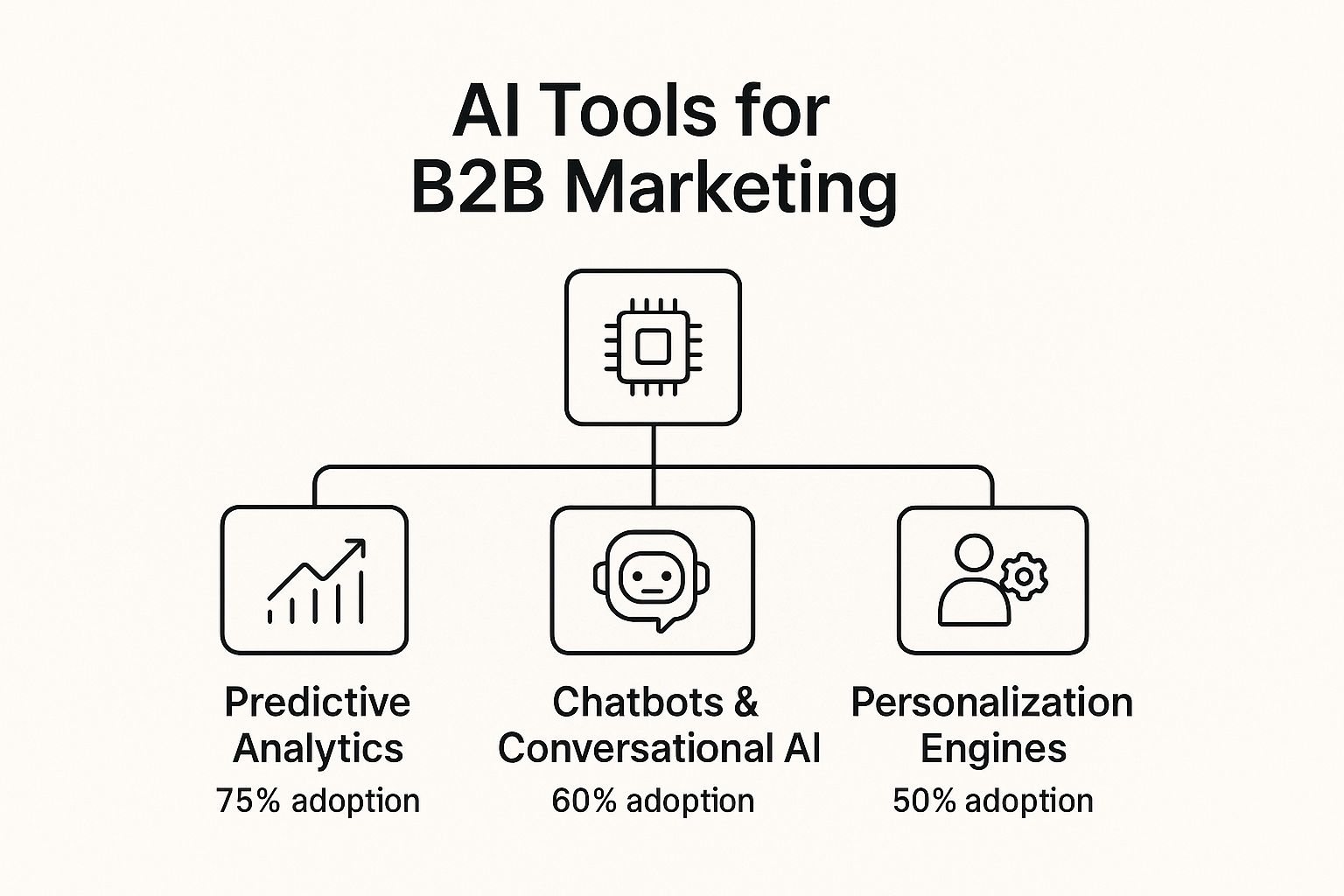
Predictive analytics is clearly leading the pack, which tells you everything you need to know: the future of B2B marketing is all about making smarter, data-backed predictions.
Smarter SEO and Content Strategy
Let’s be honest, traditional SEO can feel like throwing darts in a dark room. You pick keywords based on search volume, create content you think will work, and cross your fingers. AI flips this on its head, turning your content strategy from a reactive guessing game into a proactive, data-driven operation.
AI tools can dissect competitor content at a scale no human team ever could. They pinpoint gaps in the market, flagging topics your ideal customers are desperately searching for but where the existing content is weak or just plain wrong. This lets you create assets that perfectly match what users are looking for, dramatically increasing your odds of ranking.
Even better, AI can analyze the search results to tell you what type of content is winning for a specific keyword. Is it a blog post? A video? A free tool? Knowing this upfront ensures you invest your time and money creating the right format from day one.
Supercharging Account-Based Marketing
Account-Based Marketing (ABM) is all about focusing your best efforts on a shortlist of high-value accounts. AI takes this precision and cranks it up to eleven. It can sift through thousands of online signals to pinpoint which accounts are showing strong "in-market" intent, even if they've never visited your website.
AI essentially acts as your ultimate scout, flagging the exact target accounts that are actively researching solutions like yours right now. This means your sales team can engage with perfect-fit companies at the absolute peak of their interest, boosting connection rates and shrinking sales cycles.
AI also refines your ABM execution by analyzing the firmographic and technographic data of your best customers to build a dynamic Ideal Customer Profile (ICP). This AI-powered ICP is then used to unearth lookalike accounts you might have missed, expanding your target list with high-potential companies you never knew existed.
To see how this works in practice, we've outlined some of the https://bigmoves.marketing/blog/12-proven-b2b-marketing-ai-tools-to-boost-your-business-in-2025 that can give your business a serious lift.
Dynamic Audience Segmentation and Targeting
Static audience segments—grouping companies by size or industry—are becoming a relic of the past. A company's needs can change overnight. The modern answer is dynamic segmentation, powered by AI. This approach groups accounts based on what they're doing in real-time: what they're reading, what they're researching, and what problems they're trying to solve across the web.
This creates fluid, intelligent audiences that reflect current intent, not outdated firmographics. For a practical example of how real-time data capture can inform strategy, check out this a guide on using AI for meeting notes, which shows how you can turn conversations into actionable intelligence.
The data from marketing leaders backs this up. The table below shows which AI applications are delivering the biggest wins in B2B marketing automation.
Top AI Applications in B2B Marketing by Effectiveness

As you can see, using AI for more precise and intelligent audience identification is the top priority. This trend makes it clear: the primary goal for today's B2B teams is to zero in on the perfect customer with the highest quality data possible.
Real-World Examples of AI Marketing in Action

Theory and strategy are great, but the real magic of AI B2B Marketing happens when you see it working in the wild. It’s time to move from concepts to concrete examples and see how real companies are turning this technology into measurable wins. These aren’t sci-fi fantasies; they’re practical applications delivering results right now.
Each story here follows a familiar arc: a clear business problem, a specific AI solution, and a game-changing outcome. These scenarios make the benefits tangible and offer a blueprint for what's possible when you finally put AI to work for you.
Slashing Churn with Predictive Analytics
Picture a B2B SaaS company specializing in project management software. They were stuck with a stubborn problem: a 15% annual customer churn rate that was slowly eating away at their growth. Their customer success team was constantly playing defense, only hearing from an unhappy customer when it was already too late to save the account.
The solution? They rolled out an AI model designed to predict churn risk. This system analyzed thousands of data points in real time, looking for subtle warning signs:
- Product Usage: A sudden nosedive in daily active users or the adoption of new features.
- Support Tickets: An uptick in the number or severity of support requests.
- Engagement Signals: A noticeable drop in email open rates or webinar attendance.
- Firmographic Data: Changes at the client's company, like key executives heading for the door.
Instead of waiting for that dreaded cancellation email, the AI flagged at-risk accounts weeks in advance, assigning each a "churn score." This gave the customer success team a chance to get proactive—reaching out with targeted support, extra training, or special offers before the relationship soured.
The result was a 30% reduction in customer churn within the first year. They successfully shifted from firefighting to building stronger relationships, which dramatically boosted their customer lifetime value.
Scaling Niche Content with Generative AI
A boutique professional services firm, focused on legal compliance for the fintech industry, was struggling to produce enough high-quality content. Their audience craved deeply technical, niche articles, but their small team of subject matter experts was completely swamped. Their blog was updated sporadically, and they were losing ground in search rankings to bigger competitors.
Their breakthrough came when they integrated generative AI into their content workflow. But they didn't just ask it to write generic blog posts. Instead, they used AI as a powerful research assistant and a first-draft generator.
The real win wasn't replacing their experts; it was amplifying them. The AI handled the time-consuming groundwork, freeing up the human experts to focus on adding unique insights, strategic perspective, and real-world experience—the very things AI can't replicate.
Here’s how their new process worked: An expert would give the AI a detailed brief, including key data points and a target outline. The AI then produced a structured, well-researched draft. Finally, the expert would take that draft, refine it, and infuse it with their unique voice and experience.
This approach allowed them to quadruple their content output without sacrificing their high standards. Their organic traffic soared by 70% in just six months as they started to dominate the search results for their niche topics. You can explore more strategies like this in our guide on how winning companies use AI for B2B growth.
Optimizing Sales with Dynamic Pricing
A large manufacturing supplier sold components through a clunky B2B sales portal. Their pricing was completely static, failing to account for critical variables like order volume, customer loyalty, or real-time market demand. They were leaving money on the table with big clients and likely scaring off smaller ones with inflexible prices.
The adoption of AI is becoming mainstream. Today, half of B2B marketing leaders are already using AI, and 75% plan to use generative AI for promotion as new opportunities emerge. This enthusiasm is reflected in how companies are applying it: 67% of B2B firms use AI for product recommendations and 42% use it for pricing and segmentation.
Inspired by this shift, the supplier integrated an AI-powered dynamic pricing engine into their portal. The algorithm analyzed each customer's history, the size of their order, and current inventory levels to offer a unique, optimized price on every single quote. A loyal, high-volume customer would automatically see a better price than a brand-new buyer placing a small order.
This smart, AI-driven approach led to a 5% increase in average order value and a 12% lift in overall profit margins. By treating each customer and transaction with tailored intelligence, they maximized revenue while strengthening their customer relationships.
Your Roadmap to AI-Powered Marketing
Feeling inspired is one thing; turning that inspiration into action is another beast entirely. The thought of bringing AI into your B2B marketing can feel like you're about to boil the ocean, but it doesn't have to be that dramatic. By breaking the process down into smart, manageable stages, you can build real momentum and show value every step of the way.
Think of it less like flipping some giant, company-wide AI switch and more like building a bridge. You start with a solid foundation, lay the first few planks, test their strength, and then confidently build out from there. The goal isn't to "do AI" overnight but to weave it into your strategy where it will make the biggest, most immediate difference.
Stage 1: Start with Your Data
Before you even glance at a fancy AI tool, you need to look inward. AI runs on data, simple as that. The quality of what you feed it will absolutely determine the quality of what you get out of it. Honestly, a messy, siloed data environment is the #1 reason AI initiatives never get off the ground.
Start by rolling up your sleeves and doing a thorough data audit. You need a crystal-clear picture of what information you have, where it lives, and how clean it is.
- Map Your Data Sources: Where is all your customer information hiding? Think CRM, marketing automation platforms, website analytics, and sales records. Get it all on paper.
- Assess Data Quality: Be ruthless. Hunt for inconsistencies, duplicate records, and outdated information. Is your data standardized and reliable enough to trust?
- Identify Critical Gaps: What crucial information are you missing? What data could unlock a much deeper understanding of your ideal customers?
This first step is completely non-negotiable. A clean, unified dataset is the bedrock you'll build every successful AI B2B marketing strategy on.
Stage 2: Identify a High-Impact Use Case
Don't try to solve every problem at once. Instead of planning a massive, company-wide AI overhaul, pick one specific, high-impact problem to tackle first. This "quick win" approach lets you prove the value of AI, build internal buy-in, and learn crucial lessons on a smaller, more manageable scale.
Think about your biggest marketing headaches. Where are the most painful bottlenecks or the most glaring opportunities for improvement?
A great starting point is often a problem that is both measurable and meaningful. For instance, aiming to improve lead quality from a specific channel is a far better pilot project than a vague goal like "enhancing personalization."
A few potential first projects could include:
- Predictive Lead Scoring: Help your sales team stop guessing and start focusing on the accounts most likely to close.
- Content Gap Analysis: Find out what underserved topics your audience is hungry for that your competitors are completely ignoring.
- Chatbot for Lead Qualification: Automate those initial "just browsing" conversations on your website and free up your sales reps for serious buyers.
Choosing a focused project makes it infinitely easier to define what success looks like, measure the return, and build a story that gets everyone excited for what's next.
Stage 3: Run a Pilot Program
Once you've zeroed in on your use case, it's time to test your idea with a pilot program. This is your chance to experiment in a controlled, low-risk environment. Pick an AI tool that fits your goal—many platforms offer free trials or pilot packages that are perfect for this stage.
Treat your pilot like a science experiment:
- Define Your Hypothesis: Be specific. "We believe using an AI-powered lead scoring tool will increase our sales-qualified lead (SQL) conversion rate by 15%."
- Establish Baselines: What are your current numbers? You can't prove you've made an impact if you don't know where you started.
- Run the Test: Implement the tool with a small, focused group. For example, apply it to a single marketing campaign or give it to one sales territory to use.
- Analyze the Results: Compare the pilot group's performance against your baseline. Did you hit your goal? What did you learn?
This data-driven approach takes all the emotion and guesswork out of the decision. The results of your pilot will give you the hard evidence you need to justify rolling it out more widely. For a deeper dive into how to use AI for content, sales, and more, check out our ultimate guide to using generative AI for B2B marketing and sales growth.
Stage 4: Scale and Foster a Culture of Experimentation
With a successful pilot under your belt, you now have a powerful story to tell. Use your results to build an undeniable business case for scaling the initiative. Show leadership the concrete ROI and present a clear plan for expanding AI to other parts of the business.
But successfully scaling AI B2B marketing is about more than just technology; it's about people and culture. Encourage your team to see AI not as a replacement, but as a powerful collaborator that can make their jobs easier and more impactful. Foster a culture of continuous learning and experimentation where it's safe to test new ideas, analyze what happens, and iterate.
The journey you started with a single data audit and a small pilot program can evolve into a force that reshapes your entire marketing organization, driving smarter decisions and creating a powerful, lasting edge over the competition.
Answering Your Questions About AI in B2B Marketing
As you get ready to bring AI into your marketing, it’s only natural to have a few questions. This new frontier can feel both exciting and a little intimidating. Let's tackle some of the most common concerns head-on, giving you clear, practical answers so you can move forward with confidence.
This isn't about jumping into the unknown; it's about getting you equipped to lead the charge.
Will AI Replace B2B Marketing Jobs?
This is easily the most common question, and the answer is a firm no. AI won’t replace B2B marketers, but it will absolutely change what they do day-to-day. Think of AI less as a replacement and more as a powerful collaborator—a strategic partner that takes on the tedious, data-heavy lifting, freeing you up for what really matters.
The focus of marketing is already shifting away from manual tasks and toward high-value strategy. Instead of spending hours pulling reports, building lists, or A/B testing ad copy, marketers will get to spend their time interpreting AI-driven insights, crafting compelling brand stories, and building genuine customer relationships.
In the world of AI B2B marketing, the most successful marketers will be those who can:
- Ask the Right Questions: You still need deep market knowledge and strategic thinking to guide AI toward uncovering valuable insights.
- Interpret Complex Data: AI will surface the patterns, but it's the human expert who translates that data into a winning strategy.
- Drive Creativity: Developing a unique brand voice, a memorable campaign, or an innovative go-to-market plan is still a distinctly human skill.
The most valuable marketers of tomorrow will be the ones who can effectively partner with AI, using its analytical power to supercharge their own creativity and strategic judgment. Your role isn’t disappearing; it’s just becoming more strategic and essential than ever.
How Can a Small B2B Company Start with AI?
You don’t need a Silicon Valley budget or a team of data scientists to get started with AI. The great thing about the market right now is the explosion of accessible, user-friendly AI tools designed specifically for small and mid-sized businesses. The trick is to start small, pick a specific pain point, and get a quick win to prove the value.
Forget about building a custom AI model from scratch. Your first moves can be practical, low-cost, and deliver an immediate impact.
Here are a few high-value, low-barrier ways for any B2B company to get started:
- Content and SEO Optimization: Use AI tools to perform deep competitor analysis, find underserved content gaps, and optimize your blog posts for search intent.
- Social Media Management: Try an AI-powered scheduler that not only posts your content but analyzes engagement to recommend the best times to post and which content formats are resonating most.
- Basic Lead Qualification: Implement a simple AI chatbot on your website. Its job isn't to close deals, but to ask initial qualifying questions, route serious inquiries to your sales team, and even book meetings—all while you sleep.
By focusing on a single, well-defined problem, you can test the waters, learn how the technology works, and build a solid case for investing more down the road. The goal is to build momentum, not to boil the ocean.
How Do You Measure the ROI of AI Marketing Tools?
Measuring the return on investment for an AI B2B marketing tool means looking beyond simple cost savings. While efficiency gains are nice, the real value of AI is its ability to drive tangible growth across the entire customer journey. To capture its full impact, you need a framework that tracks a mix of efficiency, effectiveness, and strategic business metrics.
First things first: establish clear baselines before you implement any new tool. You can't measure improvement if you don't know where you started.
Next, track a balanced scorecard of key performance indicators (KPIs) that connect directly to your core business objectives. This ensures you’re measuring what truly matters.
Here’s a practical framework for tracking ROI:
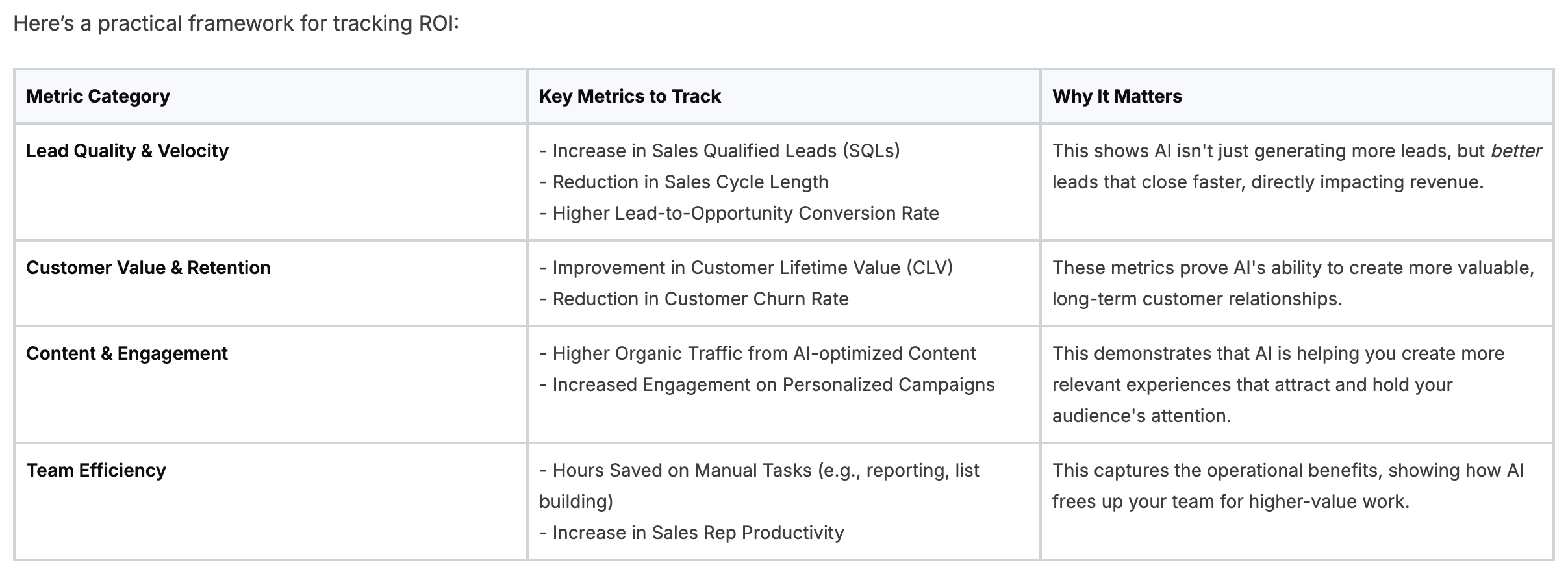
This holistic view gives you a powerful story to tell. You can show not only that the AI tool is saving time but that it's actively contributing to better leads, happier customers, and a healthier bottom line. Accurately tracking these metrics is much easier when you have clearly defined customer segments. To get this right, you can learn more about using buyer personas to accelerate B2B marketing and sales in our detailed guide.
Ready to make your next big move with a clear, data-driven strategy? Big Moves Marketing offers fractional CMO expertise to help B2B SaaS and tech startups build winning brands and accelerate growth. Let's build your go-to-market plan together.
%20png%20copy.png)

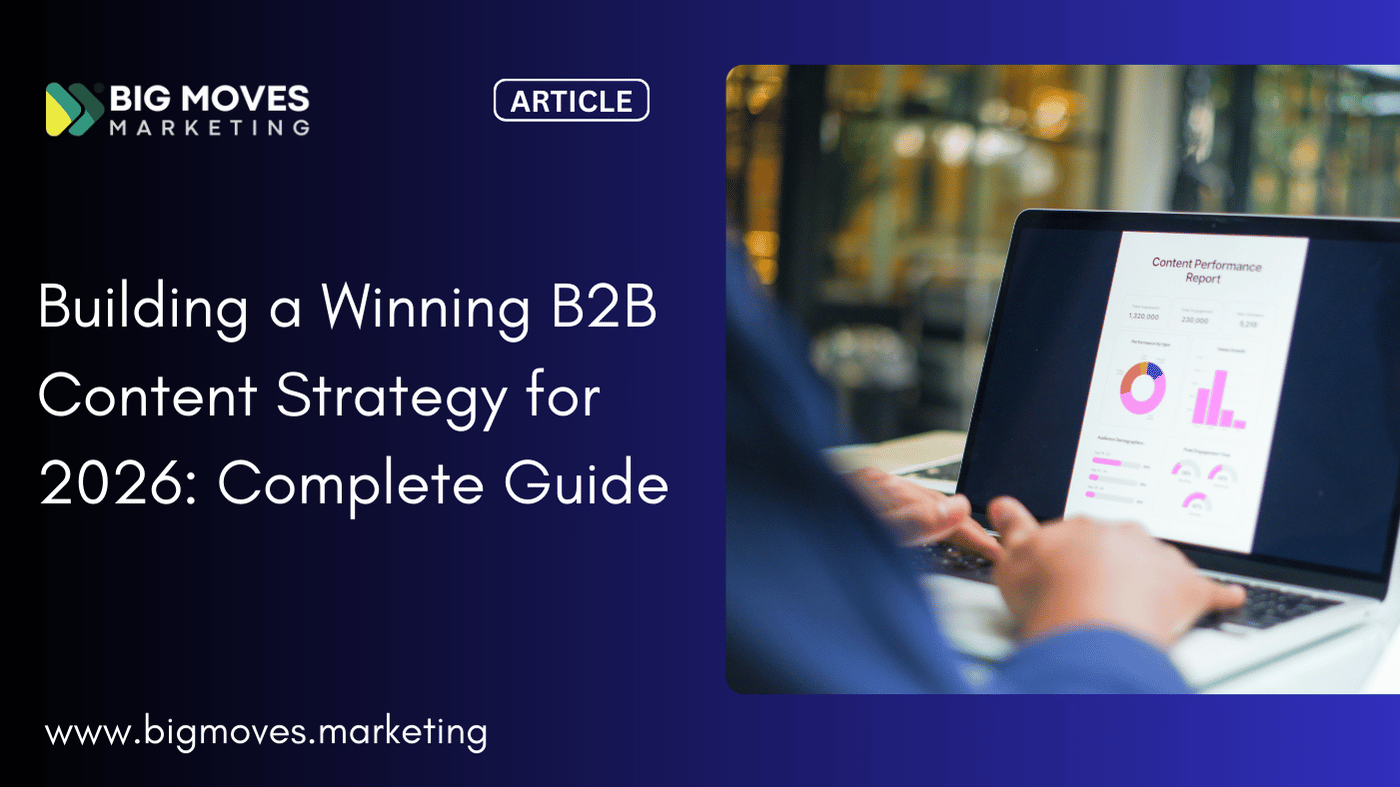

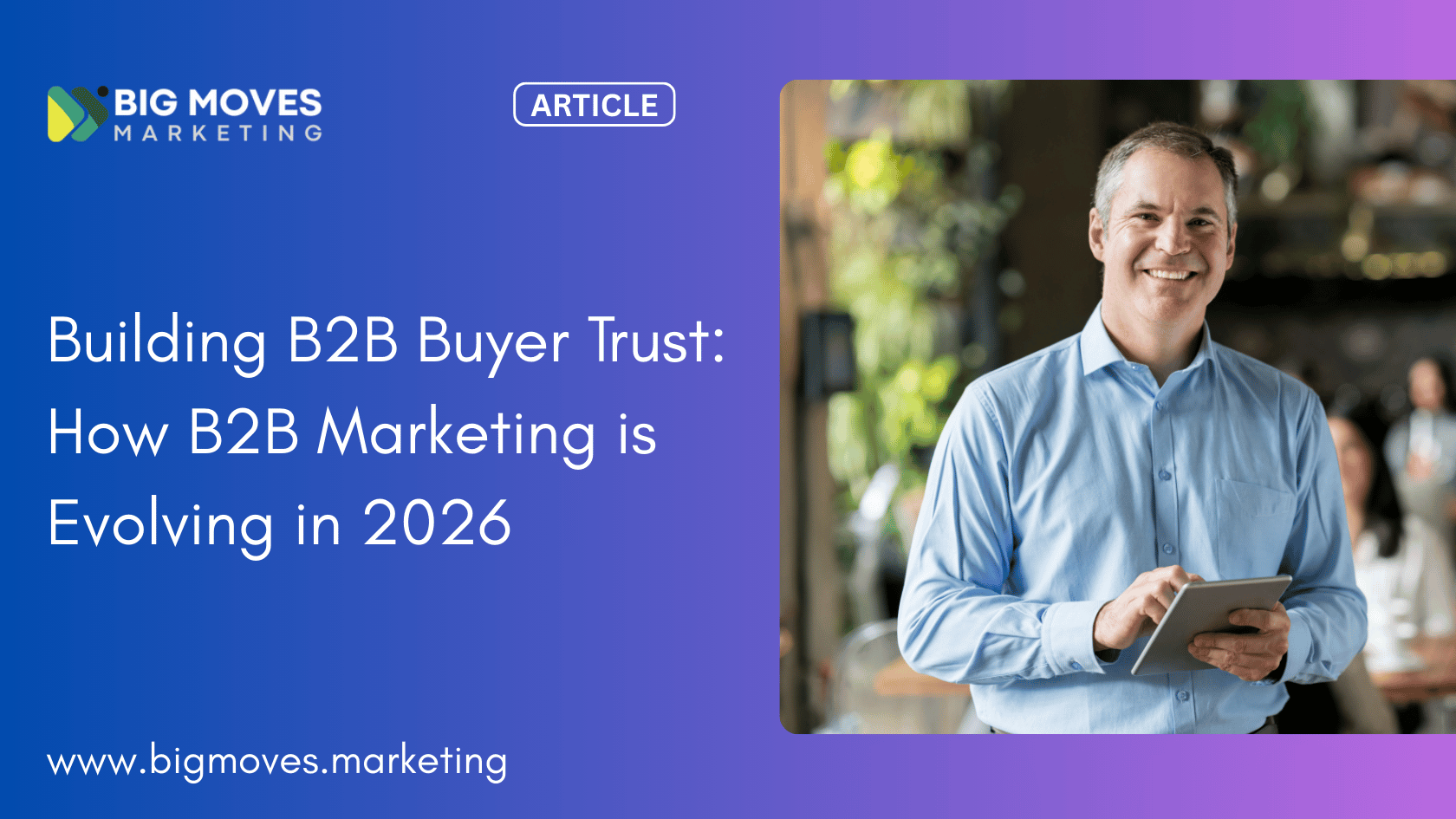


%20-%20white.svg)
